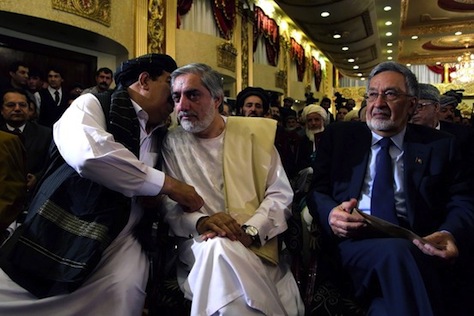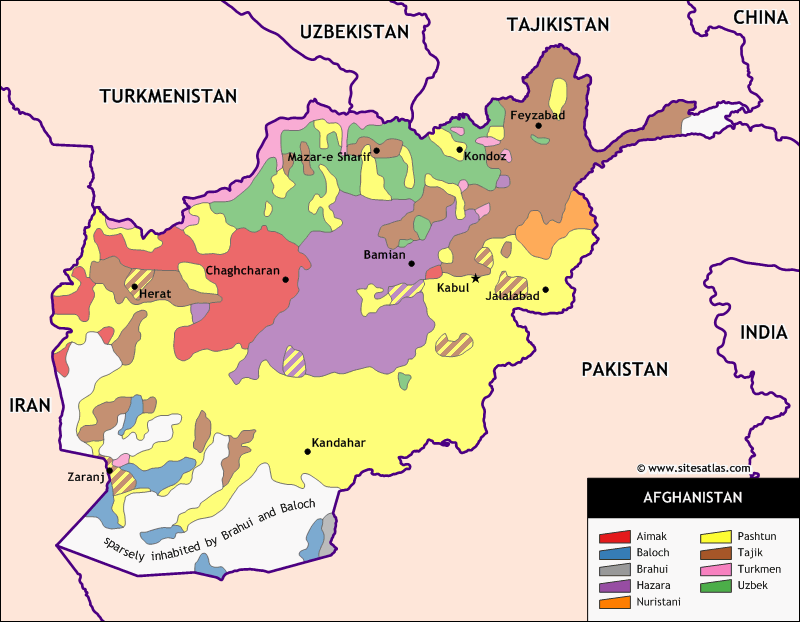Earlier this week, leading Afghan presidential candidate Abdullah Abdullah secured the endorsement of Zalmai Rassoul, the third-place finisher in the April 5 first-round election. That brings Abdullah, a former foreign minister and the runner-up to outgoing president Hamid Karzai in the flawed 2009 presidential election, the strong frontrunner in an anticipated runoff likely to be held on June 14. ![]()
Although results are due to be finalized Thursday (delayed for a day due to the high volume of serious complaints about the voting), Abdullah leads in the preliminary results with 44.94% of the vote, and if he wins the presidency, it will give the country’s Tajik ethnic minority a key role in policymaking in the years ahead.
Abdullah (pictured above, center, with Rassoul, right), who is half-Pashtun and half-Tajik, served as a chief aide to the late Ahmad Shah Massoud, a top Tajik commander of the Northern Alliance, which helped sweep the Taliban out of power in 2001-02. That gives Abdullah credibility among Afghanistan’s two most important ethnic groups. His running mate, Mohammad Khan, is a former leader of Hezb-i-Islami, a Pashtun insurgent group not incredibly unlike today’s Taliban insurgency.
His nearest challenger is Ashraf Ghani Ahmadzai, a former World Bank official and former Afghan finance minister. Ghani was trailing with 31.47% in the latest count, enough to power him to a runoff against Abdullah — but perhaps too deep a deficit to defeat Abdullah in the second round, given that Abdullah’s first-round total suggests he’s only 5.06% away from securing an outright majority.
* * * * *
RELATED: Afghanistan hopes for calm as key presidential election approaches
* * * * *
Rassoul, who won just 11.48% of the vote served until very recently as Afghanistan’s foreign minister, and he ran with the support of Karzai’s brother, Quayum Karzai, who dropped out of the presidential race earlier this spring. Though Rassoul didn’t win Karzai’s official endorsement, he’s widely seen as the candidate of the outgoing administration, and his support drew mainly from Pashtun tribes loyal to Karzai in southern Afghanistan.
In the country’s politics, building a presidential majority is less about winning over individual voters on the basis of ideology, but about cobbling together a majority from among the country’s ethnic groups. Pashtuns, largely dominating the south and east of the country, constitute around 42% of the population, and as the most populous group, have typically dominated politics — in the royal era, the Soviet era, the Taliban era and the Karzai era since 2001.
Tajiks, however, are the most dominant group in Kabul and throughout Afghanistan’s northeast, constituting 27% of the population. Uzbeks, 9% of the population, predominate in the north-central part of the country and Hazaras, which constitute another 9% of the population, live in the central highlands of Afghanistan.
Ghani’s running mate, Abdul Rashid Dostum, is a leading Uzbek warlord, and Ghani had hoped to build a coalition based on winning the largest share of the Pashtun vote and bringing along the Uzbek vote as well.
You can see how ethnic ties play a role in the preliminary election results in this map from the indispensable website Electoral Geography. Ghani was the top candidate in much of the Pashtun and Uzbek heartlands. Rassoul was the top candidate in the southern province of Kandahar, the home of the Karzais. Abdullah dominated the rest of the country, including the Hazara highlands, Kabul and the Tajik northeast.
So the thinking is that with Rassoul’s support — and conceivably the support of the voters loyal to Karzai — Abdullah should easily capture the presidency in any runoff. It’s even possible that Ghani, facing an almost certain defeat, would suspend his campaign.
That’s especially true because officials worry that another vote could be a tantalizing target for Taliban insurgents who have boycotted the election and threatened Afghan voters not to participate. Those threats cascaded in the days leading up to the vote, when Taliban fighters attacked the election commission office in downtown Kabul, killing five workers and sending international observers fleeing.
But the first-round voting largely came and went with only minor disturbances, and the Taliban’s spring offensive, which began this week, has been more subdued than in the past. That may be partially due to US and international peacekeeping forces that have largely secured most parts of the country, but it may also indicate that Ghani and Abdullah have negotiated side deals with Taliban leaders that have kept violence to a minimum. Preliminary estimates show that 6.6 million voters participated in the first-round voting, a significant increase from the 4.8 million that cast ballots in the 2009 election.
Though Karzai eventually relented to participate in a runoff five years ago after significant international pressure, Abdullah, his chief opponent, dropped out the race in protest of voting irregularities.
Both Abdullah and Ghani are keen on signing a status-of-forces agreement that would contemplate a continuing role for US and other forces in the country after the end of the year, when US troops are otherwise scheduled to leave Afghanistan for good after 13 years of occupation. Karzai, with whom relations have increasingly soured during the administration of US president Barack Obama, has refused to sign an agreement, arguing that it should be up to his successor.
Photo credit to European Pressphoto Agency.



One thought on “Did Abdullah just win the Afghan presidency?”